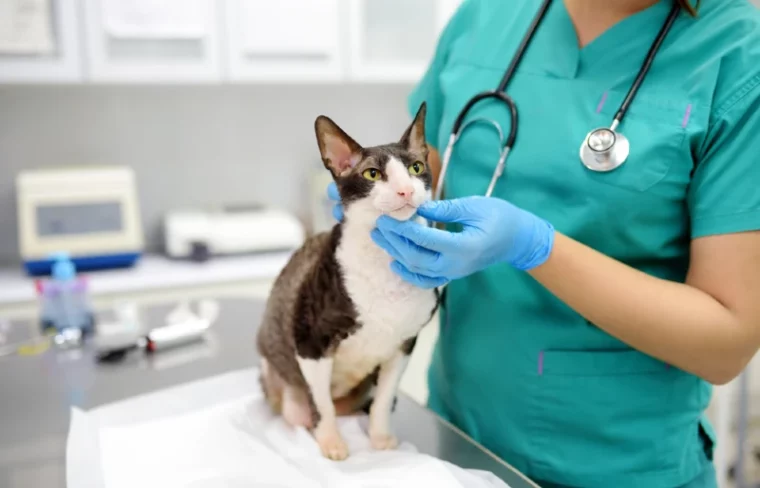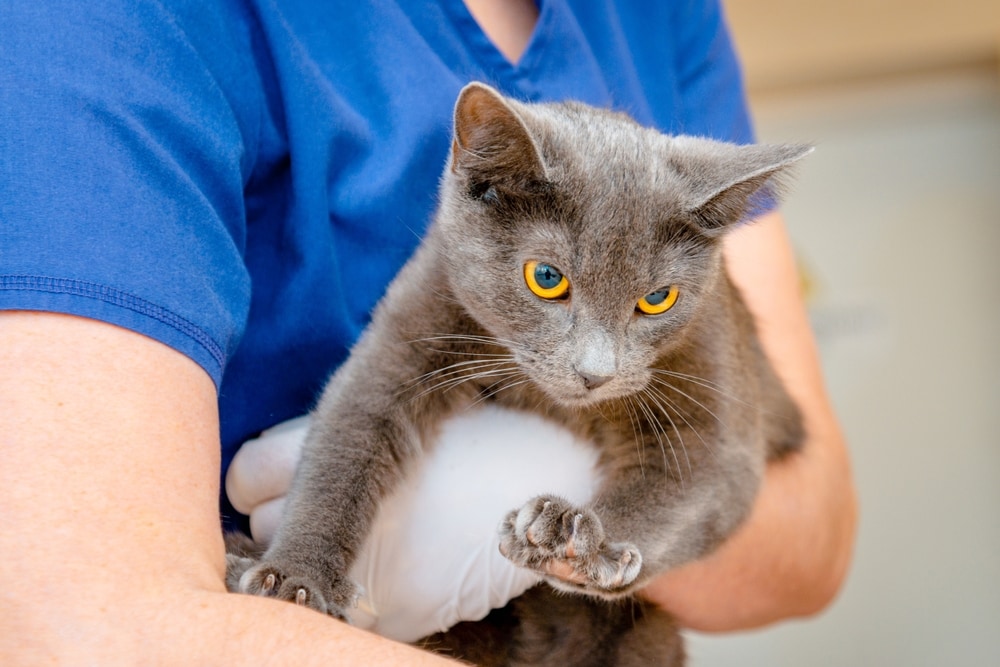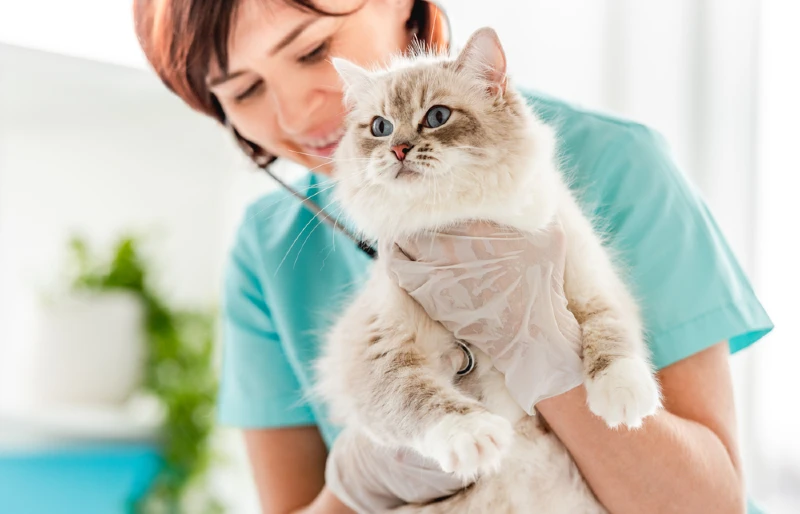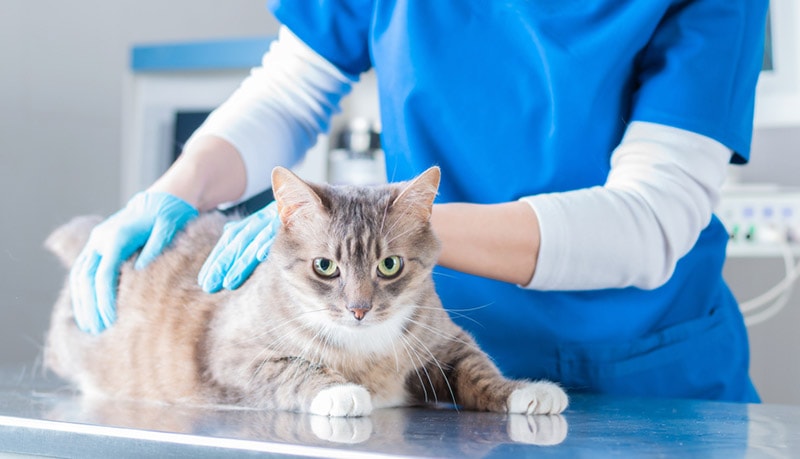
Click to Skip Ahead
Felines are curious by nature; there’s no doubt about it. And as such, they (particularly kittens) can be prone to eating things they really shouldn’t. Unfortunately, sometimes they eat items large enough to cause an intestinal blockage, which can be deadly. But how can you know if your pet is suffering from an intestinal blockage?
There are some signs you should look for if you know your cat’s eaten something that they really shouldn’t have to help you figure out if an intestinal blockage has occurred. And if one has, you need to know what to do next. Here’s what to know about intestinal blockages, so your cat can stay as safe and healthy as possible!
What Is an Intestinal Blockage?
What exactly is an intestinal blockage?1 It’s what happens when something is ingested, resulting in a partial or complete blockage in the intestines. This blockage makes it so neither liquids nor solids can pass through the intestines.
Typically, the way the gastrointestinal tract works is that it goes through a process known as peristalsis, wherein food and more get transported from the stomach to the small intestines. The process then takes whatever is moving through the system onto the large intestines, then into the colon. Finally, waste products are pushed out of the rectum and anus. But when a complete intestinal blockage occurs, it means nothing can get through. And when that happens, food and whatever else needs to be passed builds up behind the obstruction.
This blockage constitutes an emergency, one that may very well require surgery to remedy. So, if you believe your feline has an intestinal blockage, you need to get them to their vet sooner rather than later.

What Are the Signs of an Intestinal Blockage?
The most common signs of intestinal blockage (and the ones that are most often the reason felines are brought to the vet) are lack of appetite and vomiting. However, there can be other signs to indicate an intestinal blockage that include:
If your cat has ingested string or something similar, you might also see a bit of it lodged beneath the tongue or even hanging from the rectum. In this case, do not pull on the item! Whatever is there is usually tethered in other places in the body, and you could cause damage to your pet by pulling on the string.
What Are the Causes of an Intestinal Blockage?
An intestinal blockage is most often caused by a foreign body (non-food object) being ingested and causing an obstruction. Common things that cats eat that they shouldn’t include string, thread, hair bands, rubber bands, small toys and tinsel. The resulting obstructions can be either partial, linear, or complete.
A partial obstruction will happen when something small is eaten, such as a piece of cloth or a tiny toy. The signs of this kind of obstruction are a bit less noticeable than those of the other obstructions, and the remedy to the issue can sometimes be medical management, including IV fluids, to help the object pass through the system instead of surgery.
A linear obstruction is when a linear object, such as some string, is eaten. You’d think a piece of string would be small enough to pass through your cat’s system, but often, one end of the linear object gets stuck on something (like the underside of the tongue). Despite being stuck, your cat’s intestinal system is still trying to pass the object through via the end that’s free. This ends up causing plication (a bunching effect) of the intestines. And the longer the linear object hangs out in the intestinal system, the greater its chances of causing perforations that can cause the contents of the intestine to spill into the abdominal cavity. The result is peritonitis, which is life-threatening.
And then there’s a complete obstruction, which happens when your cat eats either several small objects or one large object. As the name suggests, this obstruction means nothing can move past the blockage. Signs for this sort of obstruction often come on quickly and severely.
Though the ingestion of a foreign body is what causes intestinal blockages most often, there are a few other conditions that can cause them including:

How Do I Care for a Cat With an Intestinal Blockage?
You’ll be caring for your cat by taking them to the vet immediately upon noticing any signs that may indicate an intestinal blockage or before if you know they have eaten something they shouldn’t have. Your vet may treat your pet in one of the following ways.
Some foreign objects can be removed simply by inducing vomiting while they are still in the stomach and before they cause an intestinal blockage. Whether this is the case for your cat depends on when your pet ate the object and the sort of object it is. This would require medication to induce the vomiting, but these aren’t always reliable, so it may not work. Never try to make your cat sick at home.
An endoscopy would likely occur next if a foreign object is stuck in the stomach and induced vomiting isn’t working. With an endoscopy, your cat will be under general anesthetic, and your vet will pass a camera down your cat’s throat to see where the object is and retrieve it that way.
If the object has already caused an intestinal blockage then in the majority of cases surgery will be needed. With surgery, your vet will do a laparotomy (or exploratory surgery) to locate the blockage. Your vet will talk you through the procedure. If the cause is a foreign object, your vet can make an incision to remove the object. If the intestine is badly damaged, sometimes a section of it needs to be removed. If the cause is not an object but the result of a hernia or something similar, your vet would try to fix the issue (by repairing a hernia or removing a tumor, etc.).
Now that your vet has removed the object or (hopefully) resolved the issue, if it wasn’t due to a foreign body, your vet will discuss what aftercare your cat needs. Your cat will probably need to remain at the vet clinic for a day or two. Then once your cat is home, it will usually take between 10 and 14 days for recovery, but this varies depending on the type of surgery that has been performed. During this time, your pet will need to rest and restrict any activity, and you will need to check on the incision site often to ensure it isn’t infected or swollen. You’ll also need to monitor your cat’s food and water intake. You will be in regular contact with your vet and your cat will have post-operative checks at the clinic.
Other than that, it’s important to try to reduce the risk of an intestinal blockage happening again. This means restricting your cat’s access to string, hair ties, and anything else it’s fond of eating that can cause an obstruction.
Frequently Asked Questions (FAQs)
You might have a couple more questions about intestinal blockages that haven’t been answered yet, so here are two of the most frequently asked questions about this issue.

Can Felines Pass an Intestinal Blockage?
Occasionally. In cases of partial obstruction, it’s sometimes possible for a small object to continue through the system and pass. Medical management from your vet, often including a little help from some IV fluids, may help these foreign bodies pass. Complete obstructions can rapidly cause harm to the gastrointestinal tract, so waiting to see if this sort of object will pass through is dangerous. If left untreated it can result in the death of your cat. Veterinary assessment, treatment and monitoring is essential for any kind of intestinal blockage.
How Long Does a Feline Survive With an Intestinal Blockage?
It depends on the sort of obstruction occurring and the resultant damage to the intestines. Cats that have only a partial obstruction will usually survive longer than those with a complete obstruction (though there are variables that affect this). It also depends on how quickly you can get your pet to the vet for diagnosis and treatment.
Conclusion
Intestinal blockages in cats can be life-threatening, so knowing what signs to look for is vital. If you are worried your cat may have ingested something they shouldn’t or you notice your pet vomiting, not wanting to eat, or having abdominal pain, it could be a sign that your kitty has an obstruction in its intestines. As soon as you see these kinds of signs, it’s important to get your pet to their vet straight away. There, the vet can diagnose the underlying issue and treat it accordingly. The sooner your cat has the appropriate treatment, the better the chances of them making a good recovery.
Featured Image Credit: Maria Sbytova, Shutterstock






